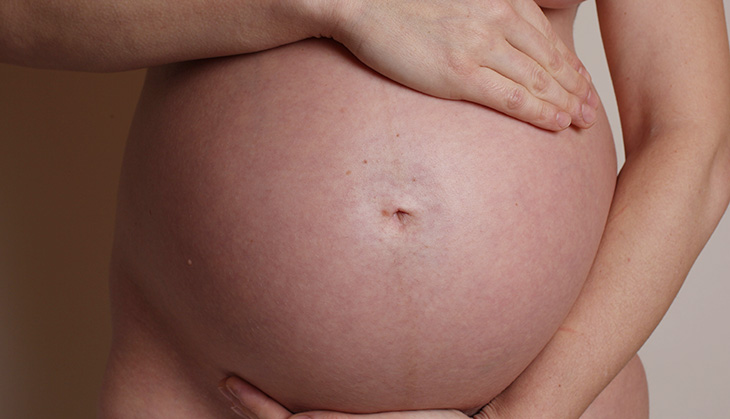How women can go the full nine months without knowing they're pregnant

It is a "notorious fact", one so commonly accepted and obvious it requires no evidence to support it in a court of law, that every woman knows when she is pregnant.
In a society that has a low tolerance for uncertainty, cases that challenge our collective notion of the possible fascinate and confuse us. Headlines such as "Baby birth shock for soldier on Afghanistan deployment", or "I had this extremely painful urge to push and that's when the head came out" are received with a mix of incredulity and scepticism. Yet cases of "cryptic pregnancy" - also known as "pregnancy denial" - are not particularly rare. In fact, they are estimated to occur in around one in 2,500 cases, suggesting around 320 cases in the UK annually, or a potential headline story almost every day.
In these cases, women lack all awareness of pregnancy and report experiencing few, if any, of the common symptoms. But uncertainty over the diagnosis of pregnancy is not unusual. While a woman who thinks that she may be pregnant can now carry out a shop-bought pregnancy test with a high degree of accuracy, historically and - even in the relatively recent past - it was not easy to confirm that a woman was pregnant. Signs and symptoms were described as "probable" and "presumptive" rather than diagnostic.
The symptoms of pregnancy
But if awareness of pregnancy can now be regarded as a notorious fact, what are the symptoms that any woman would recognise? And how could they still be overlooked, dismissed or ascribed to another cause?
Absence of menstrual periods is the most common early symptom of pregnancy. However, there are many reasons why a woman may not menstruate regularly, including some medical disorders and factors such as poor diet or stress. Women approaching the menopause are likely to have disrupted menstruation and some women stop having periods altogether when taking the contraceptive pill. Conversely, "menstrual-like" bleeding during pregnancy (any pregnant woman who experiences any vaginal bleeding should seek medical attention) is reported, although not explained, in around 1% of women.
Morning sickness, the most common pregnancy symptom portrayed in the media and drama, is experienced by around 70% of pregnant women but varies widely in severity and duration and may again be attributed to numerous other causes.
Weight gain is another usual symptom. The "average" pregnant women would be expected to gain around 12.5kg but this is widely variable and subject to cultural and ethnic difference. But many women anticipate gaining weight and an increased waist circumference around the menopause - and, at any age, weight gain is easily explained: for example, as the result of comfort eating in times of stress. The relationship between maternal and fetal nutrition is complex. Women who have a restricted diet (intentionally or unintentionally) throughout pregnancy may gain very little weight, while the baby's birth weight may still be within the normal range. Although there may be longer-term health consequences for babies of mothers whose diet is very poor during pregnancy. Either way, it is another symptom that easily can be overlooked.
Most women start to feel fetal movement between 18 and 20 weeks of pregnancy. Early movements are often described as a flutter, and in the early weeks are easily confused with abdominal gas. However, fetal movements do increase in strength as the baby grows and women are advised that they should feel movements right up until and beyond the start of labour. For those pregnant women who have had a cup kicked from their belly by the baby within, it is difficult to understand how this can be mistaken, but cases of cryptic pregnancy in which women have reported feeling no fetal movements indicate the contrary.
How does it happen?
Various physiological or psychological theories have been suggested to explain cryptic pregnancy. While it may occur more commonly in women who have a co-existing mental health condition, many cases occur in women who have no evidence of underlying mental health problems and its cause remains unknown.
Headline cases generally depict happy outcomes, but while pregnancy is a normal physiological life event, a woman who doesn't recognise that she is pregnant (and her baby) are at considerable risk both physiologically and psychologically.
For all women, pregnancy is a time of change and preparation for motherhood. While the reality of motherhood may still surprise any woman, those who are unaware of their pregnancy are likely to be profoundly shocked by their unexpected motherhood. This can be extremely difficult to overcome.
In addition, these women will not access antenatal care, complications will not be detected and women may continue to smoke or drink alcohol unaware of the potential for harm. A characteristic of cases of women completely unaware of their pregnancy appears to be that they seek medical help for severe abdominal pains. Many, however, give birth alone or without skilled assistance and this places both mother and baby at considerable and life-threatening risk.
Darker consequences
There is a darker side to the way in which cryptic birth is interpreted and understood, too. Studies of historical case reports have described the legal consequences for women who gave birth alone and where the baby was stillborn or died shortly after birth. Women's claims of cryptic pregnancy were often treated as lies - although the condition was recognised in the medical literature of the time - and women could be charged with infanticide.
Mona Rautelin in her account of such cases in pre-modern Finland also cites modern cases from Europe and China where the "notorious fact" that women will have knowledge of their pregnancy has resulted in charges of infanticide. In a recent headline case from America, a woman who claimed that she had a stillbirth after a concealed pregnancy was jailed for infanticide.
The physiology and psychology of concealed and cryptic pregnancy are different and both are complex. However, they may be difficult to distinguish in these rare and tragic cases. There are many uncertainties surrounding childbirth and even today many, superficially straightforward, aspects of pregnancy and birth remain poorly understood. While we may continue to read these news reports with some disbelief, we must ensure that we respect and protect the women behind these tales of the unexpected.
![]()
Helen Cheyne, Royal College of Midwives Professor of Midwifery Research, University of Stirling
This article was originally published on The Conversation. Read the original article.
![]()






![BJP's Kapil Mishra recreates Shankar Mahadevan’s ‘Breathless’ song to highlight Delhi pollution [WATCH] BJP's Kapil Mishra recreates Shankar Mahadevan’s ‘Breathless’ song to highlight Delhi pollution [WATCH]](http://images.catchnews.com/upload/2022/11/03/kapil-mishra_240884_300x172.png)

![Anupam Kher shares pictures of his toned body on 67th birthday [MUST SEE] Anupam Kher shares pictures of his toned body on 67th birthday [MUST SEE]](http://images.catchnews.com/upload/2022/03/07/Anupam_kher_231145_300x172.jpg)






